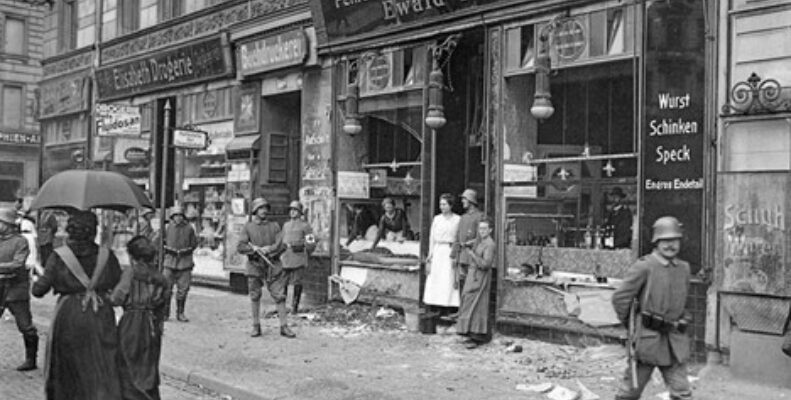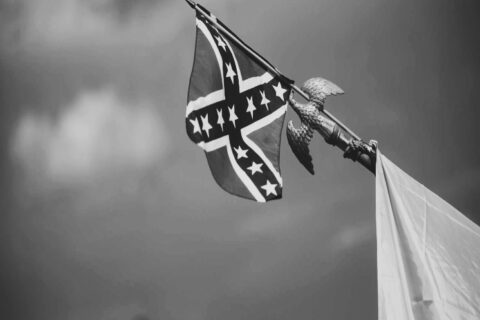The idea that the world could be hit with a major famine – not just in the normal hotspots of Africa, Southeast Asia, Central Asia, as well as a few other nations – but one that could even impact the West, is gaining increased mainstream attention. It really does look like the perfect storm is brewing between supply chain issues, skyrocketing diesel prices, the Russo-Ukrainian War, the burning of several food processing plants, and the deaths of cattle and other farm animals. The Establishment is fully prepared to shift the blame to climate change and Putin when it really hits, but there is a sense on the Dissident Right, and increasingly on the normie Right, that all of this is really planned as a way to bring the historic West into submission.
But, if I am going to be honest, part of me has always been skeptical of this claim. Don’t get me wrong, I think the elites are evil enough to do something like this, but it also appears to be an unnecessary risk. The annals of history are full of populations revolting in times of hunger, realizing they have nothing else to lose. This is particularly true in Chinese history, where famine was viewed as a sure sign that the ruling dynasty had lost the “Mandate of Heaven” and thus rebellion was a duty. Even if the peasantry were unsuccessful in overthrowing their rulers, oftentimes the government would be so weakened its fall would come soon after. Our ruling elite might be evil, but they are also incompetent, and I wonder if incompetence, rather than malice, has won the day this time.
The truth is, that while there are cases of hungry people revolting, hunger has also helped pacify populations. In order to study this, I will look at four different case studies where hunger was used as a pacifying tactic. These cases will be as follows: the Irish Potato Famine, the Allied blockade of Germany in World War I, the Holodomor, and the Soviet famine in Kazakhstan in the early 1930s.
The Irish Potato Famine is perhaps the most important event in Irish history. It is where the Irish reputation for hardline Catholicism was born. Because of the Famine, Ireland lost, either by death or emigration, around 20-25% of its population. The Famine is also why millions of people, of either full or partial Irish descent, are no longer in Ireland (I am included in this number). Historians debate over what exactly caused the Famine. Ireland produced enough food in those years to feed itself, so it cannot be blamed merely on crop failure. Thus, there are two major explanations – the majority of professional historians blame it on Britain’s obsession with free trade and a sizable portion of Irish nationalists consider the Famine as a deliberate act of genocide in an effort to crush the Irish nationalist movement. But even if the Famine was due to free trade ideology, the Famine still had the effect of crushing Irish Nationalism. Part of the Irish nationalist strategy was to revolt around every 50 years, thus giving each generation of Irishmen the duty to either revolt or teach the next generation to revolt. Ireland was scheduled for another revolt in the 1840s, but the Famine squashed any realistic chance it could have. This is important because Britain’s imperial century was largely built on two foundations: peace at home and an avoidance of a continental war. A potential Irish revolt would have undermined the first foundation at least, making Britain’s imperial ambitions much harder to pull off.
Another example of hunger being used for political ends can be seen in the Allied blockade of Germany during World War I. During the Great War, Germany was an absolute military and industrial powerhouse on the Continent, but it had one major problem – it had a relatively short coastline and was easily blockaded, a problem that was made even worse by the presence of the premier naval power of the day, the United Kingdom. Frustration with the blockade was why Germany employed unrestricted submarine war, eventually bringing the United States, another major naval power, into the war. The blockade is one of the biggest reasons Germany lost the Great War. The Allies were determined to break the Second Reich through starvation. Germany surrendered in November 1918, expecting the blockade to end, but that is not what happened. Instead, and against Christian teachings of just conduct after a conflict, the Allies continued the blockade. The rationale was simple – the Allies wanted a punitive peace treaty and make certain Germany could not refuse the terms of the Treaty of Versailles. And, that is exactly what happened. Even though Versailles contradicted almost all the terms Germany had agreed to when she surrendered, hunger had broken her. There was no way Germany could go on fighting, she had to accept the humiliation of Versailles. No doubt the utter shame Germany suffered played a large role in the degeneracy common during the Weimar Republic.
The use of hunger for political ends can also be viewed with the Holodomor, the starvation of Ukraine to break its will to resist communism. In those days, around 3.5 to 5 million Ukrainians starved to death as Soviet officials came into villages and stole their gain, leaving them with nothing. There is some debate as to the logic of the Soviets, even as all serious historians do think it was man-made. A few historians blame it on the Soviet obsession with rapid industrial progress and farm collectivization, a drive that ignored all consequences in favor of Marxist ideology. Others see it as an attempt to eliminate the Ukrainian peasantry for being peasants (peasants, with their attachment to private property and religion, were considered an impediment to communism), while others view it as an attempt to kill Ukrainians for simply being Ukrainian. Arguments can be made for all three and there is a strong enough connection between “Ukrainian “and “peasant” in the context of early 1930s Soviet society to make the distinction between the last two largely pedantic. Either way, the results were that the Ukrainians were broken – the hunger they faced sapped their strength. The national movement was severely hurt and the peasantry, the very backbone of the Ukrainian way of life, was destroyed. Ukrainians were forced to flee to the cities where they could take part in the “industrial way of life” preferred by the Soviets.
The last case of hunger being used as a political tool is the Soviet famine in Kazakhstan from 1930 to 1933. Though this happened at the same time as the Holodomor, and obviously with the same perpetrators, there is enough distinction between them to warrant its own discussion. The first thing that must be understood here is that the Kazaks are a nomadic people. In the eyes of many Kazaks, what made (and still makes) a Kazak a Kazak was/is that nomadic lifestyle. If the Kazaks were to very give up their nomadic ways and become a sedentary people, they would cease to be Kazaks. But, this posed a problem because the nomadic way of life is decidedly anti-modern and clashed with a communist system that was obsessed with modernity and progress. In order to turn the Kazaks into good communists, they must first be turned into a sedentary people and the Soviet Union went out to do just that – with lethal force. The results were an absolute disaster for the Kazak people, ripping them away from the only way of life they had known for centuries, and forcing them to become “modernized” caused untold pain and suffering. By some estimates, 50% or more ethnic Kazaks were killed in this short time period. But for all the horror, it worked, the Kazaks were forced to give up their nomadic way of life and start the process of becoming “good Soviet citizens.”
As black pilling as it is, hunger really can be used as a tool of political control. Starving people may not feel like they have anything to lose, but they also may not have the energy to resist, and that is what is facing historic Western populations in the coming famine. To make matters worse, the times when famines have caused revolts tend to be confined to the early modern period or even earlier. Later famines have been more effective as being used as a tool for political control; after all, the earliest famine discussed in this essay occurred in the 1840s. However, there is good news, the successful use of famines as political control is only short term. The United Kingdom might have staved off an Irish revolt in the 1840s, but the next Irish revolt would finally break Britain’s hold. The Allies may have used starvation to force Germany to accept Versailles, but that also did not last. The Holodomor was a devastating blow to Ukrainians, but it has also helped form their nationalist movement. By the 1950s, the nomadic life had begun to return for the Kazaks.
Hunger has caused revolts and it has forced submission. What the elites are doing is a roll of the dice. But even if they win, know that history reveals it will only be temporary. From the ashes will arise an even stronger response – as what happened in Ireland, Germany, Ukraine, and Kazakhstan demonstrated.







Well done and interesting article, sir. Thanks for sharing your knowledge and insights regarding those four relevant historic events.
Thank you so much for your kind words.
This tactic was also employed by the Lincoln administration against the South. Sherman in the Carolinas and Georgia, and David Hunter and Sheridan in the Valley. Those pictures you see of emaciated Union soldiers from Andersonville can trace their suffering back to their own government because it was the policy of the Confederate government that prisoners receive the same rations as their own soldiers. Thanks to Sherman there weren’t any.
Yep, sadly there really are too many of these to name. I just picked these four because 1) I’ve recently read about them and 2) they did work, at least in the short term.
Great article.
One semi-related addendum: when the Great Depression hit back in the 1930s, a significantly larger percentage of the population lived on farms or in rural areas IE they could grow their own food. This is not the case today wherein the overwhelming majority of people live in metropolitan areas
Every Gen X and Millenial person I have ever talked to- Yankee or Southern, White or black, rich or poor have all said the same thing: “My grandparents always talked about how scared they were if food ever became scarce again because of how crazy people are today.”
In addition to more people being able to grow their own food, we also has a high trust society back then.
It is ironic given how well fed and obese Dixie is today, but mass hunger, even mass starvation, really is a very serious credible threat and we should prep accordingly.
I was just thinking today that Gatorade powder, molasses and sugar are really undervalued prep items. They keep forever with no need to rotate and no need for cooking, so no gas, no electricity, no wood or any other way to cook is no problem. Just add water and drink.
Is it a balanced diet? Of course not, but it combats starvation. When ppl are suddenly without food they don’t die from vitamin/ mineral deficiencies. They die from depleted energy reserves. And sugar/water concoctions can buy a lot of time. Cheap.
I think rural areas, especially those far from a city of any real size, will be ok- higher trust societies and more people have the knowhow to grow food. Urban, suburban, and even rural areas fairly close to a sizable city, will become a warzone- anyone who can grow food will have to keep it guarded 24/7. I think the exurbs will be particularly nasty- they have enough land to grow food, but they are also just close enough to a city for the threat of theft to be real. There will be armed conflicts between them if food shortages hit.